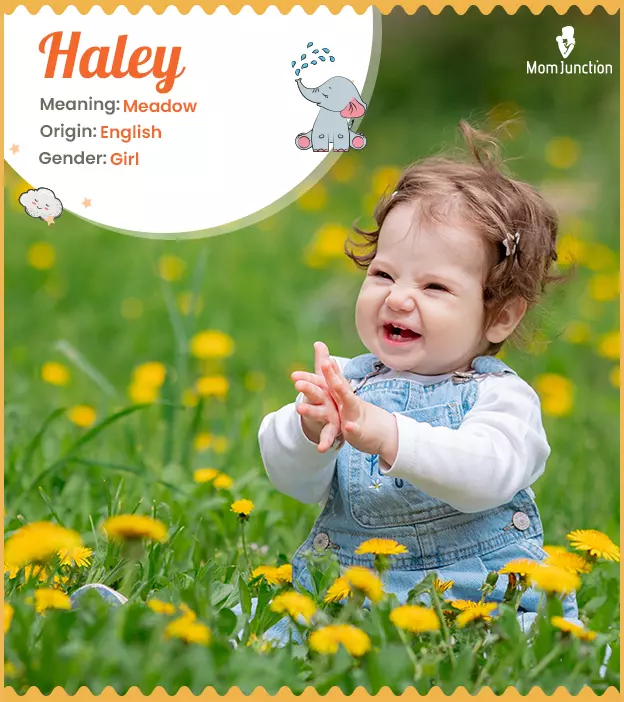Haylee is a name with a beautiful sound and rich history. It has become popular in recent years.
Choosing a name for a baby is a big decision. It carries meaning and reflects heritage. Haylee is a name many parents love. It’s charming and modern. Yet, it has deep roots in history. The name Haylee is both unique and familiar.
It’s easy to pronounce and spell, making it a favorite. Whether you’re expecting a baby or just curious about names, understanding Haylee’s meaning, origin, and popularity can be fascinating. This blog post will explore everything you need to know about Haylee. From its origins to why it has gained popularity, you’ll learn all about this lovely name.

Credit: www.youtube.com
Meaning Of Haylee
The name Haylee is a beautiful and unique choice for a baby girl. It carries a sense of charm and elegance. This name has gained popularity due to its modern appeal.
Etymology
Haylee is a variant of the name Hayley. The name Hayley originates from Old English. It means “hay clearing” or “hay meadow”. The name combines “hay” (hay field) and “ley” (clearing or meadow).
Symbolism
Names like Haylee often symbolize nature and tranquility. They evoke images of peaceful landscapes. A name that carries such symbolism can inspire a serene personality. It can also reflect a love for nature and simplicity.

Credit: www.youtube.com
Origin Of Haylee
The name Haylee has a beautiful and rich history that many parents find appealing. Understanding its origin can provide a deeper connection to the name and its meaning. Let’s uncover the historical background and cultural significance of Haylee.
Historical Background
Haylee is derived from the Old English name “Hayley,” which means “hay clearing” or “hay meadow.” This name was originally a surname used to describe people who lived near a field of hay. It evolved over time from being a place-based surname to a popular first name.
During the Middle Ages, surnames like Hayley were common. They helped identify individuals based on their occupation or location. The transition from surname to first name gained momentum in the 20th century, especially in English-speaking countries.
Cultural Significance
Haylee has a special place in modern culture. It’s often associated with a sense of nature and simplicity, reflecting its “hay meadow” roots. Many parents choose the name for its gentle and pastoral connotations.
In popular culture, Haylee has been embraced by various celebrities and public figures, adding to its charm. The name’s versatile spelling variations, such as Hailey, Hayley, and Haley, also contribute to its widespread popularity.
Have you ever considered how the origin of a name might influence your choice for a baby? Reflecting on the history and cultural significance of Haylee might give you a new perspective on its timeless appeal.
Choosing a name with a rich background can be a meaningful decision, connecting your child to a legacy that spans centuries. Haylee’s origin offers a blend of historical depth and modern relevance, making it a compelling choice for many parents.
Popularity Of Haylee
The name Haylee has gained attention over the years. Parents often seek unique names that still feel familiar. Haylee fits this description well. Its charm and simplicity make it a favored choice.
Trends Over Time
The popularity of Haylee has seen shifts. It first gained traction in the late 20th century. The name saw a steady rise in the early 2000s. Many parents chose Haylee for its modern sound. Over the last decade, its popularity has fluctuated. Trends show that it remains a beloved choice for many. The name continues to appeal due to its timeless feel.
Geographical Popularity
Haylee’s popularity varies by region. In the United States, it is particularly loved. Southern states show a higher preference for this name. It also finds admirers in parts of Canada. The name’s appeal crosses borders. English-speaking countries often favor it. Its universal charm makes Haylee a popular choice worldwide. Different spellings of the name also contribute to its widespread use. Each variation adds to its overall popularity.

Credit: www.momjunction.com
Frequently Asked Questions
Where Did The Name Haylee Come From?
The name Haylee is a modern variation of the name Haley. It originated from the Old English surname Hales, meaning “hero” or “hay meadow. “
What Is The Origin Of The Name Haylee?
The name Haylee originates from the English surname Haley. It means “hay clearing” or “hay meadow. ” It is a modern variant of the name Hayley.
Is The Name Haylee Rare?
The name Haylee is relatively uncommon. It is a unique variation of the name Haley. Haylee is not widely used.
What Ethnicity Is The Name Hailey From?
The name Hailey is of English origin. It is derived from a place name meaning “hay meadow. “
What Is The Meaning Of The Name Haylee?
Haylee means “hay clearing” or “hero”. It signifies strength and natural beauty.
Conclusion
Haylee is a charming name with deep roots. It reflects a sense of warmth and friendliness. The name has gained popularity, appealing to many parents globally. Its lovely sound and easy pronunciation make it a favorite. Haylee carries a modern twist while preserving its classic origins.
Parents love its versatility and unique appeal. The name suits children with bright, cheerful personalities. Choosing Haylee can be a delightful decision for many. Its essence resonates with positive vibes and elegance. Consider Haylee if you seek a name with beauty and timeless charm.




